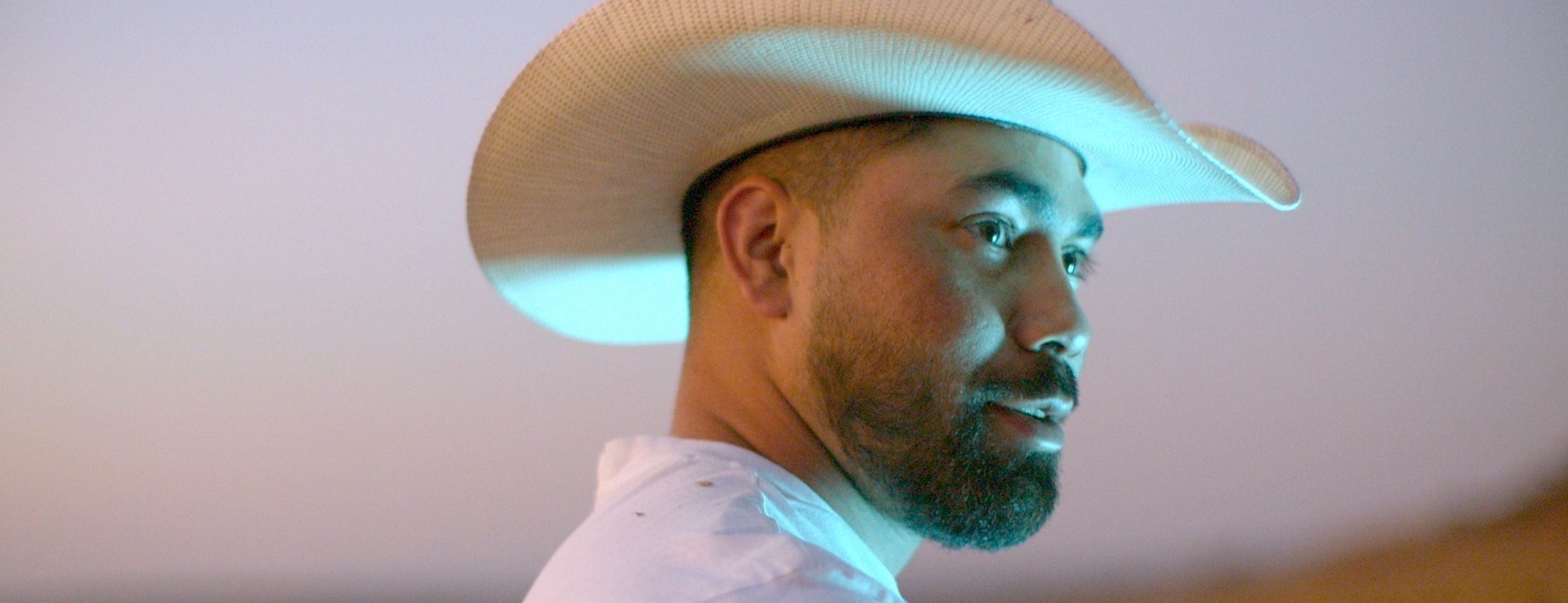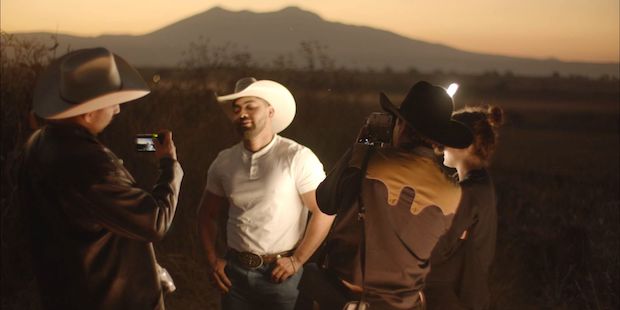Jaripeo

Jaripeo is a documentary feature that moves through the cross-section of queer identity and mass migration as experienced through a rural rodeo in Michoacán, Mexico.
Project type: Nonfiction Feature
Project status: Production
Director: Efraín Mojica
Director: Rebecca Zweig
Producer: Sarah Strunin
Producer: Victoria Gutiérrez Fernández
Director of Photography: Josué Eber Morales
Editor: Analía Goethels
Email: slstrunin@gmail.com
Help independent filmmakers tell their stories.
Make a donation to Jaripeo today.
Film Independent’s Fiscal Sponsorship program opens the door to nonprofit funding for independent filmmakers and media artists. Donate today and help bring Jaripeo to life.
Logline
At the rural rodeos in Michoacán, México, a hypermasculine tradition is rife with hidden queer encounters. Guided by director Efraín, Jaripeo follows two rancheros as they navigate desire, machismo, and mass migration from one rodeo season to the next.
Synopsis
Every Christmas Day in Penjamillo, Michoacán, the annual jaripeo, or “remittance rodeo,” is put on for the thousands of people returning from the US to spend the holidays with their families who remained there.
The jaripeo represents a mythology of what it means to be a Mexican cowboy from Michoacán for those who have been pressured to leave that life behind. At once, it triggers nostalgia and reasserts its cultural dominance to a population that has largely left the state. It says to its diasporic audience: Do you remember what it’s like to be a man in Mexican society? Let us remind you how it is, how it should be.
The story that we are telling is director Efraín’s own: they grew up between Penjamillo and Riverside, California, and as they got older, participated in surreptitious cruising at the town’s jaripeos. As Efraín guides us through an experience they know firsthand, conveying a complex and unarticulated subculture, this story set at the jaripeo becomes an interrogation of machismo from a queer lens.
In addition to Efraín’s perspective, we meet our two protagonists, Noé and Joseph, at the Christmas Day jaripeo and from there we follow their lives for a year between rodeo seasons as they navigate transnational love and rural life. Joseph is a flamboyant gay man, mostly embraced by the community, while Noé presents straight and though is out to some members of his family, still lives mostly in secret. Their stories are punctuated by abstracted, stylized scenes that speak to shared experiences between these men: cruising at the jaripeo grounds, meeting covertly in the cornfields, and facing family humiliations.
Using the jaripeo as the stage on which we follow the lives of our characters, a space opens up to question: What lies beneath the performance of machismo? How does queer desire survive in oppressively traditional spaces? How will our characters find belonging in masculinity, in their community—in themselves?

Meet the Filmmakers
Efraín Mojica – Director
Efraín Mojica (they/them) is a photographer, filmmaker and multi-disciplinary artist from Michoacán. Their work has shown in galleries around the world including in Berlin, Barcelona, Seattle and Mexico City. Video art has always been a central part of Efraín’s work – since their first short film Remoto won silver medal in the international Film Festival “Infonatrix” in Romania, they have created experimental visual projects for the music scene in Seattle and directed music videos for Sub Pop and Hardly Art Records. Their filmmaking is heavily influenced by their work as a conceptual artist which explores the translation and interpolation of different mediums – light, sound and matter. After spending 2 years with an artist visa in Berlin, they landed back in Mexico with a new perspective on the norms that exist here – this new freedom has inspired the direction of their work over the last two years.
Rebecca Zweig – Director
Rebecca Zweig (she/her) is an award-winning poet, journalist, and literary translator based in Mexico City. Her work has been featured in The New York Times, The Nation, and Revista Nexos, among others, and she has received grants and fellowships from the Iowa Writers’ Workshop, the Academy of American Poets, and the Robin Green and Mitchell Burgess Fund, among others. She is currently working on a feature for Harper’s Magazine the postwar electronic scene in Kosovo and Serbia. She is also working on a scripted series about Nazario Moreno, leader of Michoacán’s infamous La Familia cartel, that is currently in development with award-winning Mexican director Santiago Mohar Volkow. She is a graduate of the Iowa Writers’ Workshop and former Visiting Assistant Professor of Writing at the University of Iowa.
Sarah Strunin – Producer
Sarah Strunin (she/her) is a documentary producer living in Los Angeles, CA. She is currently working as a freelance Producer at This Machine Filmworks on their development team under Elise Pearlstein. In 2018 and 2019 she worked as a Story Producer on R.J. Cutler’s Apple TV+ Series Dear and the acclaimed STARZ documentary series Seduced: Inside the NXIVM Cult, directed by Cecilia Peck. She recently co- produced director Liza Mandelup’s upcoming feature film, Caterpillar, with Topic Studios, premiering at SXSW this year. Sarah just finished co-producing the documentary series Murf The Surf by Director R.J. Cutler, Executive produced by This Machine Filmworks and Ron Howard’s Imagine Entertainment. Her background as a casting and story producer and her affinity for connecting with people, motivates her interest in telling character-driven stories that can speak to the global issues of our time and the human experiences that connect us all.
Victoria Gutiérrez Fernández – Producer
Victoria Gutiérrez Fernández (she/her) is originally from Spain and has worked in Mexico’s film industry for over ten years. She has worked for production companies Laredo 17, Artegios and the Iberoamerican Fenix Awards. She is now a production coordinator at Woo Films where she’s been working on a number of Netflix television series including La Casa de las Flores, Érase Una Vez and Sagrada Familia, all directed by Manolo Caro. She was also recently involved in the making of Ruido, directed by Natalia Beristain, which premiered at the San Sebastian Film Festival.
She produced her first film, Pedro directed by Liora Spilk Bialostozky, that had its premiere at Morelia Film Festival last year and its world premiere in Malaga Film Festival.
Josué Eber Morales – Director of Photography
Josué Eber Morales (he/him) is a cinematographer based in Mexico City. In recent years, Eber has worked on television series for Sony Pictures, Paramount, and Viacom, as well as commercials for brands like Coca-Cola, Chevrolet, Tecate, and Dove, among others. He began his career working as a colorist and this foundational understanding of light and color informs his work. His use of vibrant tones and dark shadows allows him to capture dynamic, cinematic scenes as well as quiet moments of intimacy. He has recently filmed two independent films, both of which are in post-production, and is currently Director of Photography on an upcoming series for Netflix.
Analía Goethels – Editor
Analía Goethels (she/her) studied editing and post production in Barcelona, Spain. Her work has been screened in a number of international film festivals including Shanghai International Film Festival (Sísifos, best documentary award), FID Marseille (Lumbre, CNAP Award), Donostia Zinemaldia, Sitges Film Festival, FICUNAM and Morelia International Film Festival. She is lead editor of DERIVA.MX, a transmedia project that uses film and an array of digital tools, databases, generative algorithms, online participation of the audience among others to propose a new approach to understanding violence in Mexico. The short films resulting from this project have been shown in museums, universities and film festivals like AMBULANTE and Morelia International Film Festival. She co created DERIVA68 an interactive piece about state terrorism commissioned by Tlatelolco’s Memorial Museum in CDMX. She is currently part of the Mexican Editors Association (AMEE) in the committee for the protection of assistant editors labor rights and emerging editors.
Make a donation to Jaripeo.
Contact
For inquiries, please contact fiscalsponsorship@filmindependent.org.